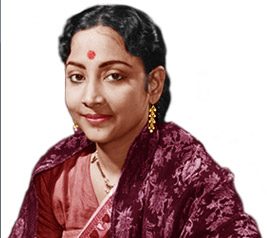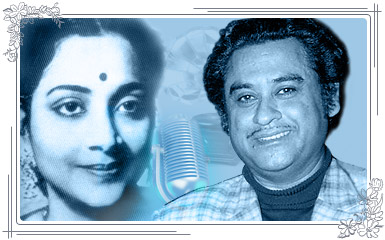Born as Abhas Kumar Ganguly on 4th August, 1929, this great singer known as Kishore Kumar was one of those very few singers who took risks and experimented with different styles of music. Considered to be a legend in Hindi film world, this multi faceted persona has excelled as a playback singer, actor, composer, lyrics writer, director, producer and script writer. The songs of Kishore Kumar have an extraordinary blend of romance, emotions, naughtiness and melancholy.
Kishore Kumar was born on 4th August 1929 in a middle class home at Khandwa. He was the youngest in the family. Kishore Kumar's father, whose name was Kunjhalal Gangoly, a lawyer by profession, was a modest man. Kishore's mother Gauri Devi, hailed from a wealthy family and had received an education denied in those days to most girls. Of the four children, Ashok Kumar was the eldest, born on 13 October 1911 and was twenty years older than Kishore. He was followed by a daughter who was about 15 years older to Kishore. Her name was Sati Devi. The next was a boy, Anoop Kumar - who was about 5 years older than Kishore, who was the youngest of all.
Kishore Kumar used to sing for his parents and they would give him money as a small token. His father often asked him to sing Ashok Kumar's song from the movie Achut Kanya.(Main ban ki chidya .. bolun re..). Kishoreda was good at imitating and this was near to perfect when it came to singing K.L.Saigal's songs. K.L.Saigal turned out to be his mentor and meeting him was his wish at the top of his mind. Sadly, the meeting with Saigal did not take place, for Saigal passed away soon after Kishore's arrival in Mumbai.
Ashok Kumar thought it was best for Kishoreda to try and pick up acting by initially doing small roles in films and he also considered that just singing was not lucrative as acting. Kishore knew that he was cut out to do the romantic hero. He felt was just an ordinary looking person. In his heart, Kishore resolved to try and pursue a singing career, which he was confident about. He was rejected many times on the pretext of "Your voice is no good; us mein woh cheez nahin hai.'
He was offered a small role in the movie Ziddi and it happened in the making of this movie. Khemchand Prakash heard Kishore Kumar sing and was impressed. He told Ashok Kumar that the boy (Kishore) had a future as a singer. Khemchand went ahead and gave a song to Kishore who executed it in a typical Saigal style..Marne ki duayen lyon maangon.... What impressed Khemchand was the skill with which Kishore held the tune.
Sr.Burman was visiting Ashok Kumar when he heard Kishore sing in his bath. When he was told who was singing, he decided to wait and meet Kishore. He complimented his singing and told him that he should develop a style of his own. In his own words 'Saigal is undoubtedly a great singer, but there not much sense in imitating him; a singer needs to have a distinct style that is his own.'
What launched KK as a hit was Aradhana with his Mere Sapnon Ki Rani under the music direction of S.D.Burman and with the romantic Rajesh Khanna on the screen created an everlasting magic. After Rajesh Khanna went out of the scene, Kishore Kumar belted out chart topping hits for superstar Amitabh Bachchan. When R.D. Burman stormed the music world, Kishore Kumar re-surfaced with hits like Roop Tera Mastana and many other melodious songs. Some films that deserve a special mention are Hum Kisi Se Kum Nahin, Kinara, Dream Girl, Anurodh, Sharabi, Mr. Natwarlal, Gol Maal, Dostana, Manzil, Padosan, Shalimar, Khatta Meetha, Kasme Vaade, Ghar, Don, Muqaddar Ka Sikandar, Chalti Ka Naam Gaadi, Dilli Ka Thug, etc. Kishore also worked as Music Director for films like Door gagan ki chaao mein, Door ka rahi, Jhumroo, Hum do Daku, Zameen Aasman, Badti ka naam daadi etc where he was to some of the finest melodies ever.
Geeta Dutt and Kishore Kumar sang a total of only thirteen songs together in Hindi films, but these songs seem to bear an unmistakable stamp of their personalities. The songs are full of joie-de-vivre, confidence and are highly individualistic. Add to it the rare ability of making a joke at their own expense and the desire to experiment with the mood and sentiments expressed in the songs and we already have a formula which ventures from the beaten track.
Their collaboration started under their common mentor, S D Burman who had them sing together for the first time in both Bengali and Hindi films in 1950. Pyar introduced them in ‘ek hum aur doosre tum’, a sweet romantic number whose breezy style belied the depth of the opening lyrics. Kishore Kumar’s slightly nasal style is still the voice of his early days, exceedingly sweet and mellow. ‘O bewafaa yeh toe bataa’ is a sad, melancholy song, which progresses like a reproachful conversation between two lovers.
After a while came Jaal (1952), which had a peppy duet ‘de bhi chuke hum dil’, a conversational and enticing piece. The voices of Kishore and Geeta played perfect match for Dev Anand and Geeta Bali on the screen.
In 1954, the two of them sang four duets, one for Adhikar (‘kamata hoob bahut kuchh’) composed by Avinash Vyas and the other three for Miss Mala, composed by Chitragupt. ‘kamata hoon bahut kuchh’ is about the two of them arguing about household expenses and highlights Kishore Kumar’s talents and vocal dexterity; at times mocking, at times teasing, he vocalizes the exasperation of the hard-up husband to the hilt. This song is a rollicking listening experience. The composer is Avinash Vyas, who was a sort of type cast into composing music for mythological films. This is a refreshingly different film and songs for him and his fans.
On a side note, Adhikar (1954) was remade into Sweekar Kiya Maine (1983). The original had Kishore and Usha Kiron as the leading cast while in Sweekar Kiya Maine (1983) the same pair was played by Vinod Mehra and Shabana Azmi.As SKM was based on Adhikar totally, the song was also taken on the same lines.. and the interesting aspect is Kishore Kumar singing it both the times, once in 50s and once in 80s.
Of the songs for Miss Mala, ‘do dil jab chupke chupke’ is a romantic song with unexpected twists, there aren’t too many songs which go ‘do dil jab chupke chupke nain milaaye, duniyawaale peechhe peechhe dande leke aayein’! The somber melody heightens the comical effect. ‘dekho naa dekho humne’ has similarly unconventional lyrics while ‘naachti jhoomti muskuraati aa gayi chandni raat’ has the two of them cooing words of love set to delectable melody.
The next song from the pair comes after a gap of three years in 1957 for the film Bandi. ‘Ghar ki raunak hai gharwali’, is reminiscent of ‘kamata hoon bahut kuchh’ in its exploration of the unconventionality of Kishore’s voice. In this song, both Kishore and Geeta are kind of “emphasizing” as to how important it is for a man to get married and have a wife. Only Kishore can pull off funny lines like “Biwi ke sang miley muft mein, sasuraa sasu Sali”!
An interesting song is ‘jab jab tujhko chhua’ composed by N. Dutta for Jaalsaaz in 1959. While this song was censored and removed from the film, the supposedly incendiary lyrics were watered down and in the movie, ‘Hip hip ho ho hurrah’, sung by Kishore Kumar and Asha Bhonsle took its place.
But in the same year, the one song which endured was the melodious duet ‘dekh aasmaan mein chaand muskuraye’ for Shararat. An unapologetically romantic song, this song showcased the sweetness of the voices of both Geeta Dutt and Kishore Kumar. The same can be said for ‘tu ne meraa dil liyaa’ from the same movie, a foot-tapping song with an O. P. Nayyar-like feel to it, from the stable of Shankar-Jaikishan.
Shankar-Jaikishan used the duo again for Krorepati (1961) when they lent their voice to ‘Kabul ki main naar, meri aankhein raseeli kataar’. This is not a particularly exceptional song, it might be more important in context than by itself.
The collaboration between these two extremely talented singers ended with the gloriously magnificent Salil Chowdhury composition for Half Ticket (1962), ‘aankhon mein tum, dil mein tum ho’. Geeta Dutt starts the song off with a lazy but swashbuckling confidence and then Kishore Kumar comes in and carries the tune off to great heights. There couldn’t have been a better song to round up this extremely short but fun collaboration for Hindi films.
Bengali Songs:
Geeta Dutt's introduction to Bengali film songs as a singer must have been the S D Burman composition 'sundari lo sundari' for Samar in 1950; this song was a trio with Kishore Kumar and Arun Kumar. This is a very folksy song and the percussions in the background give it a very festive and upbeat feel. This basic melody line was used again by S D Burman to tune ‘anari, anari, anari re’ and it was sung by Geeta Dutt for Munimji in 1955. R D Burman revamped the tune and used it for another set of Bangla and Hindi songs in 1981, 'phulkali re phulkali' sung by Kishore Kumar and Asha Bhonsle for Anusandhan and 'manchali o manchali' sung again by the same duo for Barsaat ki ek raat.
The only other Bengali duet between Geeta Dutt and Kishore Kumar was for the immensely popular film Lookochuri in 1958, composed by Hemanta Mukhopadhyay. 'shudhu ektukhaani chaaoaa' is a lovely romantic song and showcases that aspect of both singers' voices admirably. Geeta Dutt's voice comes into the song at a higher pitched antara for both the stanzas and the transition into the lower pitched mukhda makes for a very satisfying listening experience. Kishore Kumar’s voice is subdued and his quiet, restrained performance does perfect justice to the feel of the lyrics.
|




